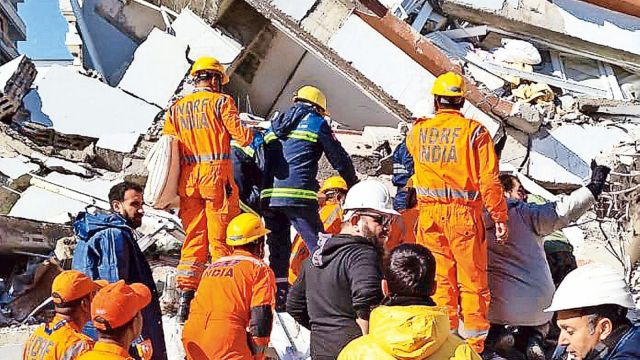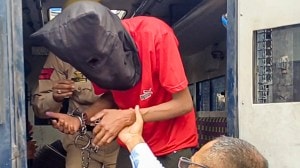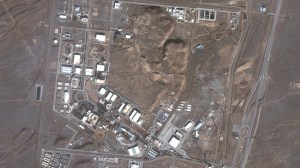In Panchkula, disaster preparedness draws youth amid fears of conflict spillover
125 residents attend NDRF’s civil defence training camp at Tau Devi Lal Stadium
Panchkula | May 16, 2025 00:07 IST
 There were logistical delays too, with the session starting an hour late — at 10 am instead of 9 am — and ending around 1 pm. Participants said better time management would improve future sessions.
There were logistical delays too, with the session starting an hour late — at 10 am instead of 9 am — and ending around 1 pm. Participants said better time management would improve future sessions.
By Serena Gujral
As fears surrounding conflict grow — even without direct violence — residents of the Tricity are responding not just with concern, but preparedness. On Monday, 125 participants, largely aged between 18 and 25, took part in a civil defence volunteer training programme held at Tau Devi Lal Stadium, Sector 3, Panchkula. The one-day event, conducted by the National Disaster Response Force (NDRF), aimed to equip citizens with basic skills to protect themselves and others in times of crisis.
Held from 9 am to 12 pm, the training included modules on fire safety, evacuation techniques, and basic first aid. While the Tricity has not been directly impacted by the Indo-Pak conflict, the flood of war-related news and misinformation has stirred unease.
“One never knows what could happen. These situations can get sour quickly, and it is important to ensure that we are somewhat prepared. I want me and my family to stay safe,” said Dimple, 20, a medical student who attended the programme with her 18-year-old sister Nikki.
Others came motivated by a sense of service. “We chose to come here because we are interested in these kinds of programmes. We were part of the National Service Scheme (NSS) as well, and we believe that courses like these build awareness and communication skills,” said Vikhyant (19), a BTech student, and Aashish (19), a law student.
The volunteers found the session informative, especially the emphasis on staying calm in emergencies. “In a country like ours, many people panic easily. Programmes like these teach us a systemised approach to difficult situations,” added Vikhyant.
Conducted in Hindi to ensure greater accessibility among the predominantly Haryanvi participants, the training used everyday scenarios to explain technical concepts. Demonstrations included CPR techniques on dummies and the making of a donut-shaped bandage cast. Audience participation was also encouraged, though some felt it could have been more engaging.
“They could have definitely done this in a more interactive manner. A lot of lectures overlapped, and the sessions got a little boring. Also, only a small number of participants volunteered for the audience demonstrations. These skills don’t develop unless one practises them, and I feel not everyone got that chance,” said Aashish. He suggested that smaller rotating groups for each module might have allowed more hands-on practice.
Despite such feedback, most attendees felt the training exposed them to valuable new material. “A module on self-defence would have been extremely helpful, as we know that women are especially vulnerable to violence in times of conflict,” said Dimple. Vikhyant added that a section on how to identify threats would also have enhanced the programme.
There were logistical delays too, with the session starting an hour late — at 10 am instead of 9 am — and ending around 1 pm. Participants said better time management would improve future sessions.
Even without a certificate of completion, most said the effort was worth it. Dimple and Nikki plan to share what they learned with their family, while Vikhyant and Aashish are looking to attend more such modules. “These initiatives are extremely helpful — we hope more such initiatives take place to prepare us better,” said Nikki.







